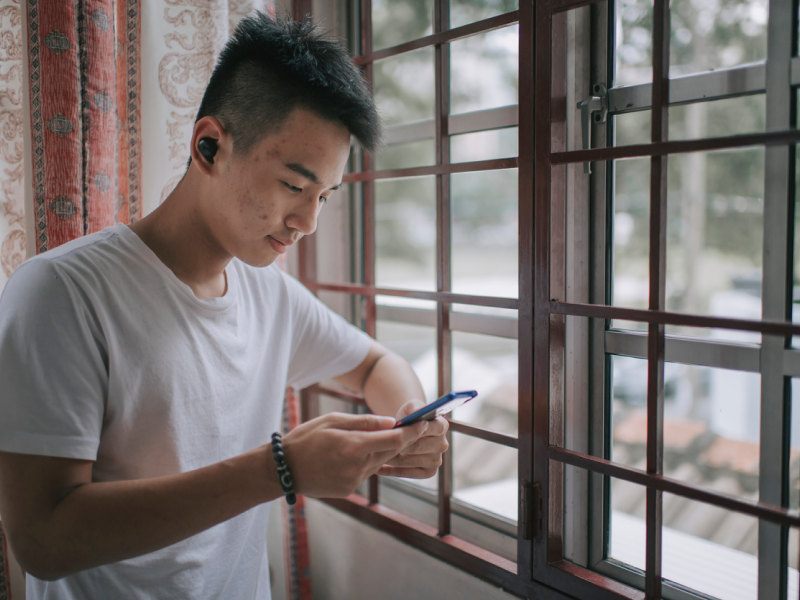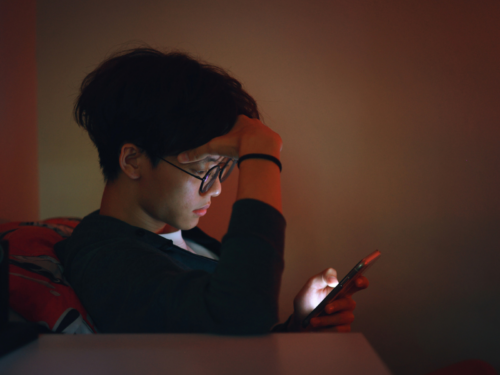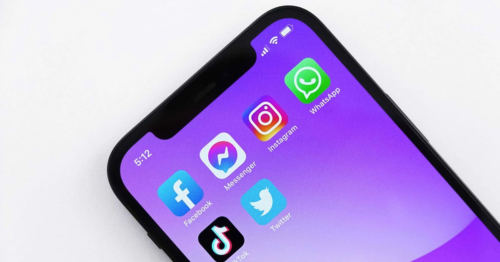
Table of Contents
TikTok and Mental Health: What’s the Connection?

Written By: Dr. Rasna Kaur Neelam

Clinically Reviewed By: Dr. Don Gasparini
May 6, 2023
7 min.
Young people in the United States are in the midst of a mental health crisis, and many wonder if social media platforms are to blame. In this article, Charlie Health Chief Clinical Officer and Co-Founder Dr. Caroline Fenkel, DSW, LCSW, gives her expert opinion on the link between TikTok and mental health.
Learn more about our Clinical Review Process
Table of Contents
It’s nearly impossible to talk about the youth mental health crisis without talking about social media. Generation Z, people born between 1997 and 2013, have never known a world without cell phones and social media. These “digital natives,” now between the ages of 11 and 26, grew up alongside Facebook and Instagram—all while these platforms suppressed information about their harmful effects on mental health.
When TikTok rose to prominence in the United States in the late 2010s, the platform quickly became the subject of scrutiny. Its “addictive” nature can leave users (most of whom are young people) scrolling for hours at a time, and information spreads particularly quickly on the app—though not all of it is accurate.
Many began to wonder about TikTok’s impact on Gen Z’s mental health, including Dr. Caroline Fenkel, DSW, LCSW, Charlie Health’s Chief Clinical Officer and Co-Founder, who’s spent her career working with young people. In this piece, we’ll unpack the youth mental health crisis and TikTok’s impact on young people’s mental health with Dr. Fenkel’s expert insights.
Causes of the youth mental health crisis
It would be convenient – but inaccurate – to say that social media is the sole cause of the youth mental health crisis.
Experts, including Dr. Fenkel, agree that many factors contribute to this crisis, especially given the tumultuous events of recent years. On top of world traumas, individual and environmental stressors (like family dynamics, drugs and alcohol, genetics, and racism) have always impacted mental health and continue to do so, Dr. Fenkel pointed out.
“It’s impossible to say which factor is the cause of this crisis because mental health is inherently personal. Each person will face these challenges differently,” she said. Here are some of the most critical factors affecting the youth mental health crisis, according to Dr. Fenkel:
Increased awareness and diagnosis
Improved awareness, discussion, and diagnostic measures related to mental health may be increasing the number of mental health diagnoses we see in the United States. Mental health conditions have always existed, but we are more comfortable speaking about and treating them now. While this does not completely explain the rise in mental health challenges, it may be a contributing factor.
Perfectionism and academic pressure
This generation is facing enormous pressure at school and in the workforce. Competition amongst peers, impostor syndrome, the feeling of constantly needing to succeed, and defining your worth by your productivity all can contribute to isolation and mental illness.

Personalized virtual care plans for teens and young adults.
Healing happens at home.
Concern about the future amidst climate change
Eco-anxiety, or anxiety surrounding climate change, has been well documented in many studies. Additionally, young people are expressing anxiety and fear surrounding the future in higher percentages than individuals from other generations.
School shootings
An increase in mass shootings in the United States, specifically school shootings, can leave survivors and witnesses feeling anxious, depressed, and in a state of panic. The politicization of these shootings can have negative consequences on a person’s mental health.
The COVID-19 pandemic
During the COVID-19 pandemic, many young people were isolated from their peers, experienced illness and loss, and had supportive networks fractured. These changes occurred at a pivotal and important time in their development and had profound impacts on their mental health and resiliency.
Social media and youth mental health
The connection between social media and youth mental health is complex and difficult to study.
The rise of social media parallels an uptick in youth mental health issues, but studies consistently show mixed results about how the two factors are linked. Platforms like Instagram, Facebook, Snapchat, and TikTok can make young users feel more connected and informed but also increase thoughts of self-harm and suicide, studies show.
“Social media might be the only way for a young neurodivergent or queer person to connect with someone like them, but it might make other young people compare their bodies or social plans to each other in an unhealthy way,” Dr. Fenkel said.
After working with young people for over a decade, though, Dr. Fenkel believes one thing is certain: “Social media is here to stay. We can’t ignore its impact on this generation of young people and need to just keep studying it.”
Harmful effects of TikTok on youth mental health
Although studies are mixed, at least some show the following harmful effects of TikTok on youth mental health:
Misleading information
It’s easy for TikTok users to create educational videos about mental health and mental illness. But not all users are as educated on these topics as they should be. In one study, researchers looked at the top 100 most popular videos of ADHD. After watching them and reviewing their content, researchers classified 52% of videos as misleading. That’s over half of the videos!
Incorrect self-diagnosis
Clinicians are increasingly noticing teens and young adults incrorrectly diagnosing themselves with mental health conditions on TikTok. Diagnosing someone with a mental health condition takes careful consideration, years of clinical experience and practice, and an understanding of a person’s day-to-day symptoms. If you watch a video and think you relate to some of the signs and symptoms of an individual with ADHD or autism, for example, you don’t necessarily have the same diagnosis.
Addiction to the app
We hear from TikTok users all the time that the app is so addictive, even more so than other social media apps. Why is this the case? It could be the “infinite scroll” capability, the short length of videos, and the desire to garner more likes, views, and follows. The app is also designed to show users content that they might be interested in rather than content only related to their friends or followed pages, meaning it’s easier for people to get drawn in for long periods.
Join the Charlie Health Library
Get mental health updates, research, insights, and resources directly to your inbox.
You can unsubscribe anytime.
Positive effects of TikTok on mental health
Some studies have shown that social media platforms, including TikTok, benefit youth mental health in the following ways:
- Community building where you can hear from people who have experienced similar struggles as you.
- Uplifting commentary as you share struggles.
- Feeling less isolated by connecting with others and realizing you are not alone.
How to use TikTok to benefit your mental health as a young person
“We won’t know the long-term implications of social media use for many years, but there are things you can do now to use platforms like TikTok in healthier ways,” says Dr. Fenkel. Here are some of her suggestions:
- Set boundaries: Ask yourself when and for how long you would like to use social media like TikTok every day. Many phones have built-in apps to help you monitor the time spent on each platform.
- Check in with yourself: Ask yourself how you feel after using TikTok. Do you feel jealous, sad, or lonely after being on the app? Is it affecting your responsibilities, relationships, or friendships? Be honest with yourself. If you feel any of the above are true, try taking a break from TikTok for a week or longer and then check in with yourself again. Did the break help change any of these feelings? If so, consider lessening your time spent on TikTok.
- Check your sources: If you are getting information about mental health conditions on TikTok, check where the information is coming from. Experts like licensed clinicians or psychiatrists will be the most accurate sources of information.
- Consume consciously: Think about who you are following and what content you consume. Next, think about how the content you consume may relate to the stressors in your everyday life. For example, looking at videos and pictures of other people’s bodies may not be healthy for you if you are unhappy with your body. Or, if you are anxious about college applications, watching videos of students getting into college may only make your anxiety worse. Speaking with a healthcare professional or trusted adult about your mental health is also encouraged.
How can parents and caregivers help young people use TikTok in healthy ways?
The role that parents and caregivers play in monitoring or discussing social media usage with their children will differ from family to family, Dr. Fenkel points out.
She recommends setting aside time to talk proactively about social media. “Setting ground rules up front is always better than having these conversations after an incident has happened,” she said. Here are some topics for parents and caregivers to consider discussing with their children:
- What is an appropriate amount of time to spend on TikTok daily?
- What are safe or unsafe websites and content?
- Who can children communicate directly with?
- Are there any parental controls that need to be added to children’s phones?
- In what situation would we limit or remove access to a child’s social media?
What Charlie Health can do to help with youth mental health
If TikTok is impacting your mental health or the mental health of a loved one, Charlie Health may be able to help. Founded in response to the youth mental health crisis, Charlie Health’s virtual Intensive Outpatient Program (IOP) provides personalized services for young people who could use more than weekly therapy.
Our licensed team of clinicians can help with a wide range of mental health conditions, from anxiety and depression to PTSD and beyond. Get started today.




